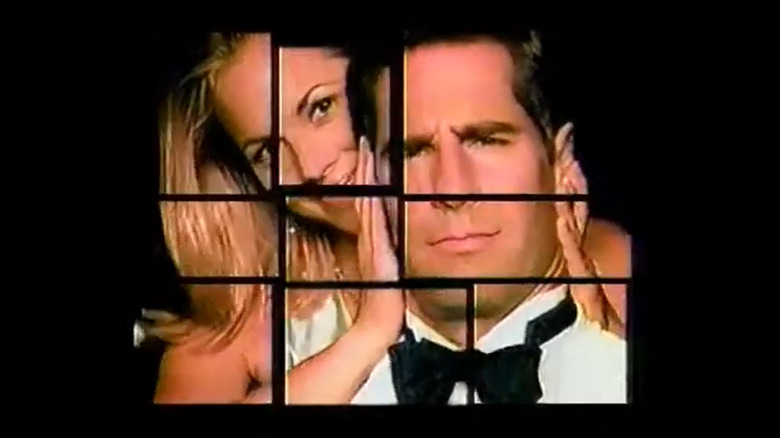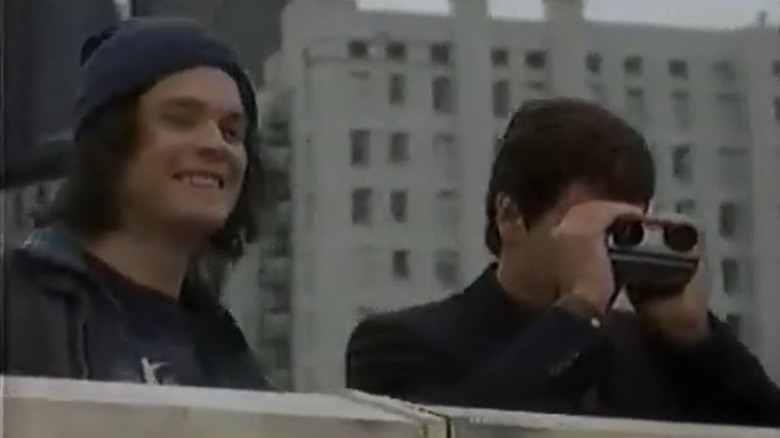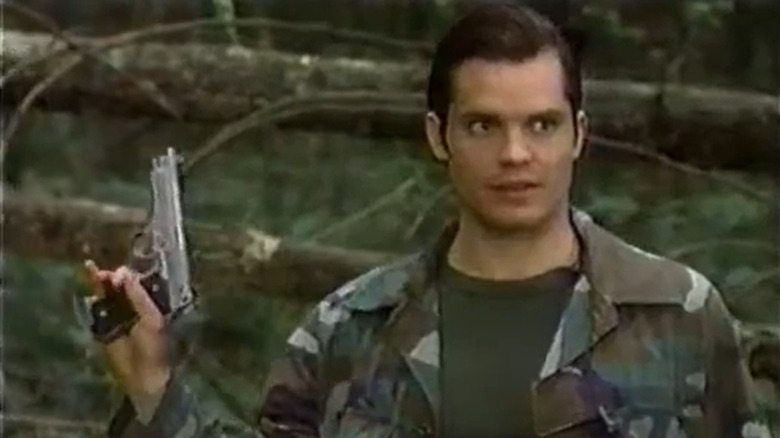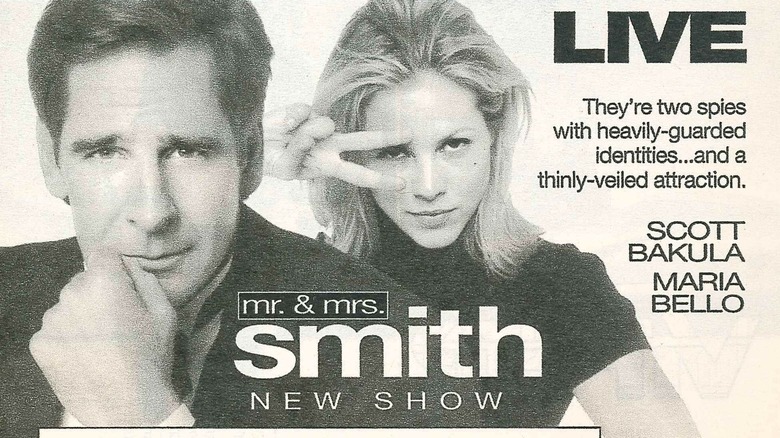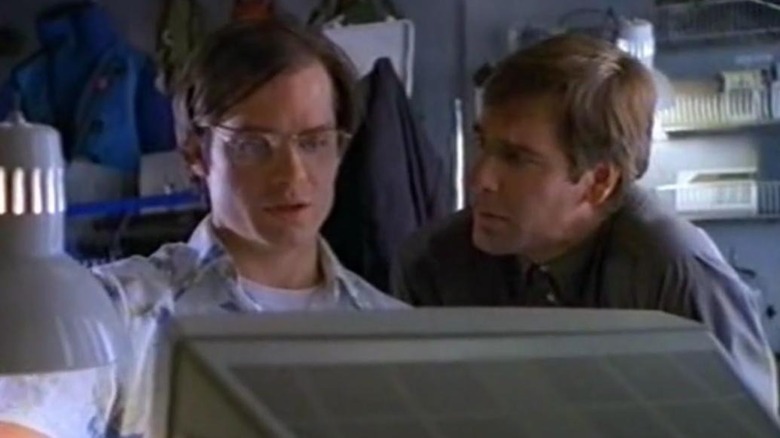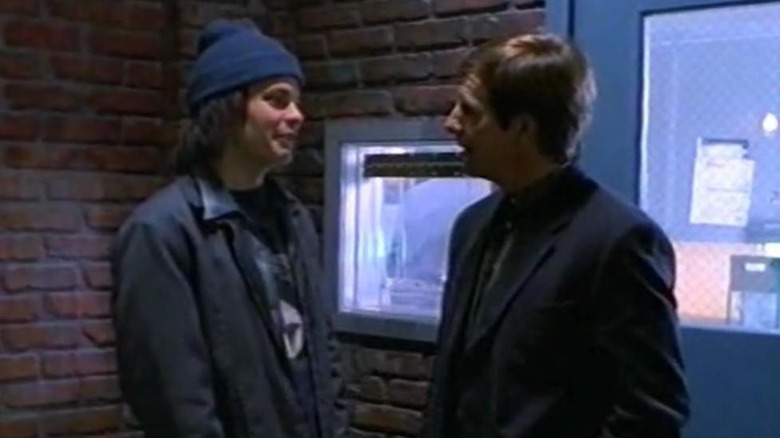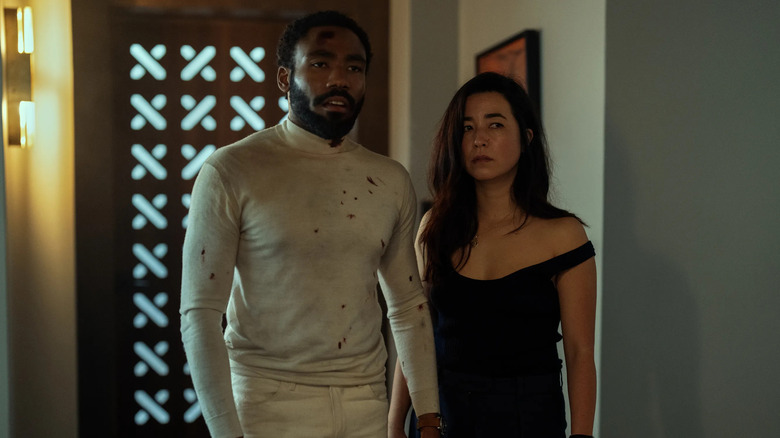The Original Mr. & Mrs. Smith Was A '90s CBS Show – And It's Been Lost To Time
Nearly a decade before Brad Pitt and Angelina Jolie were shooting machine guns at each other in their own on-screen home, Scott Bakula and Maria Bello were beating each other up in the pilot episode of "Mr. & Mrs. Smith." The 1996 CBS show started off with the soon-to-be Mr. Smith stumbling across the soon-to-be Mrs. Smith on a secret mission. After a lot of fighting and mayhem, they team up by the end of the pilot and the premise of the show is established: From this point on, the two spies will work together, pretending to be a married couple who call themselves the Smiths.
It's a premise that sounds awfully familiar to fans of the '05 movie, and even more familiar to viewers of the brand new Amazon series of the same name. Just as Donald Glover and Maya Erskine's characters slowly develop feelings for each other over the course of multiple missions — missions that basically function as dates — Scott Bakula and Maria Bello's Smiths also form a romantic connection throughout their show. They may tell themselves it's just a work relationship, that their marriage is purely a cover-up, but who are they kidding?
Not an official remake
The idea that the '96 show is the source material for the new show, which relies on the idea that the 2005 film is also based on the '96 show, might make sense on paper. Although the older Smiths' relationship does not develop as quickly as Glover and Erskine's relationship, the original series had the same general trajectory in mind, just stretched out to better fit a TV landscape with 20+ episode seasons. But despite how implausible it might seem that the new show is a completely unconnected property, the '96 show's co-creator Kerry Lenhart has confirmed to /Film that any connection between his show and the '05 film (and subsequently, the Prime Video series) really is a coincidence:
"I know my writing partner went to the movie and went, "They've ripped us off!' ... And then I went to the movie and I said, well, I mean, they're spies, the names are the same, but they're married, ours aren't [officially]... I could see where somebody might have watched our show, and it could have inspired them to come up [with the '05 movie] but I can't say it was based on it. Officially, it absolutely wasn't. But even unofficially, there's just too many differences."
The '05 movie had the big difference of revolving around the titular spies genuinely not knowing about the other's jobs. Even the seemingly absurd coincidence of the identical titles makes sense when you remember that "Mr. & Mrs. Smith" was the name of a 1941 romantic comedy directed by Alfred Hitchcock; although that movie didn't contain spy elements, it's easy to see the appeal of a married spy story playing off the title. "Mr. & Mrs. Smith" originally brought to mind an innocent romantic comedy, so it made for a fun subversion to give that title to a story about spouses trying to kill each other. The fact that "Smith" is a common fake name certainly didn't hurt either.
How the idea came about
When Lenhart and co-creator John J. Sakmar originally pitched the idea for their series, their working title was just "The Kiss." This was because the core of their idea, the inciting incident the story was built around, was of "two spies who spy on each other because they have this connection, this attraction to one another" — an attraction that's sparked by an early kiss they share out of necessity to keep their cover. Although CBS changed a lot of what they wanted for the series, the network let the storytellers keep this element: "They [Mr. and Mrs. Smith] are competitors, but early on they share a kiss and that locks it."
As for how they got the famous Scott Bakula on board with the project? "We knew Scott from many years earlier," Lenhart said. "He'd been in the first pilot we had ever done, long before 'Quantum Leap.'" The show's Mrs. Smith, Maria Bello, joined under similar circumstances: "We had just done a pilot with her the year before, which was the first thing she'd ever done. She said, 'I read the script, I really want to be Mrs. Smith.' So she came in, she read with many other potential Mrs. Smiths, and she was just far and away the best."
One surprise standout in the first episode is a young Timothy Olyphant as the one-off character Scooby. This was one of his first ever roles, but he was already displaying the mischievous qualities that would attract the interests of the "Scream 2" casting department just a year later. Lenhart explained how they'd previously worked with Olyphant on the pilot for "77 Sunset Strip," where Olyphant told them beforehand, "This is the first time I've ever acted on camera ... so be kind."
The '96 show's cancellation
Although the premise of married spies has since proven to be a very lucrative one, the show itself received poor ratings and reviews, and was cancelled nine episodes in. "To be honest, 'Mr. & Mrs. Smith' is a mess, a suspense-romance that tries too hard and delivers too little on both sides of the hyphen," wrote one critic in The Gettysburg Times. "How many times can this series rewrite the same premise?" asked another critic just four episodes in. When the show was cancelled and replaced with the returning drama "JAG," critics couldn't help but point out how uniquely definitive the cancellation was. "In a rare move, CBS actually used the C-word, instead of the euphemistic 'on hiatus,'" wrote The New York Daily News. "The drama is history. It won't air again."
There are a lot of reasons the show was cancelled, but one thing that certainly didn't help was CBS's tendency to switch up the order of the episodes, which was a problem for a show that was slightly more serialized than most shows of its time. "CBS made a late episode switch to one that already has 'Mrs. Smith' jealous of a woman who makes a play for her partner," one critic noted. "Last week, it seemed as though she couldn't stand him."
Lenhart himself noted that he and Sakmar wanted the show's second episode, "The Suburban Episode," to be the fourth. "[The network] said suburbia, that's what they want the show to be ... we wanted to save our suburban episode for the fourth so we could establish the glamour and the high tech and the intrigue and that stuff. So then being in suburbia would seem kind of like, 'Oh, this is odd now.'"
CBS's meddling
Sure enough, the re-arranged episode order made the show feel awkward and inconsistent. The humor that comes with these spies being forced into a suburban environment doesn't hit as hard as it could've, because we haven't gotten to spend as much time in the high-stakes spy world as we would afterward. It's something Lenhart considers the '05 movie to have handled much more gracefully. In his view, the movie properly showed "just how high tech and how glamorous [the Smiths] were" before they settled down into boring married life.
There were a lot of other elements Lenhart and Sakmar wanted to include in their show, most of which are things the '05 movie later had the creative freedom to pull off. Some of this was just the realities of TV's smaller budget — "We kept getting our action scenes toned down. We kept getting our locations toned down," Lenhart explained — but a lot of it had to do with CBS's unwillingness to depict anything that might be deemed too edgy. "I wish it could have been a little sexier, I wish it could have been a little bit more international, a little darker," he said, all of which was indeed done by the '05 movie to great success.
Why was CBS so hesitant? As Lenhart pointed out, the channel's brand at the time was defined by shows like "Touched By An Angel," "Father Dowling Mysteries," and "Murder, She Wrote." It was a safe, family-friendly network, and they wanted "Mr. & Mrs. Smith" to be watered down to fit within that category. "They wanted something a little softer with their brand," Lenhart said.
A show done dirty
The show's failure seems like a clear case of a risk-averse network trying way too hard to play it safe. It's especially frustrating, since the supposedly riskier approach would go on to result in a massive financial success less than ten years later. The 2005 movie made $487.3 million and has now spawned a TV series; it has so thoroughly overshadowed the '96 series that most people (even those who were adults in the '90s) don't seem to remember that the show ever existed. The '96 series is not available on any streaming service, nor can you buy any DVDs of the first season anywhere. If you want to watch the series, you'll have to make do with the low-quality recordings on YouTube.
Beyond those videos, the '96 TV show might as well have been erased from existence, which is a shame because it's not even a bad show. The chemistry between Bakula and Bello is genuinely fun to watch, and Timothy Olyphant's guest role in the pilot is a delight for anyone familiar with the actor's many charismatic roles over the years. At the very least, the show deserves to be available to any viewers who wants to check out, rather than borderline unfindable as it currently is.
There's been plenty of talk lately about the importance of physical media, and this show's mistreatment is a perfect example. If it weren't for the fact that someone back in 1996 took the time to record those season 1 episodes, even as blurry as those recordings are, any trace of the show might now be gone forever.
At least one silver lining
The Amazon series is not officially connected to or inspired by the '96 show at all. Besides the '05 movie, co-creator Francesca Sloane has cited Alfred Hitchcock, Ingmar Bergman, and "reality series such as Married At First Sight" as their main influences. No one involved in this new show has spoken publicly about the '96 series, and given how forgotten the old show is today, there's a chance none of them have ever heard of it.
Despite that, it does feel like the Amazon series is a spiritual successor to the '96 show, if not an literal one. It follows the same general premise and even many of the same basic character beats; this show's John Smith is also the more emotionally vulnerable of the two, whereas Jane is also the more standoffish. It follows the same overall trajectory Lenhart and Sakmar planned for the '96 series, but with far fewer network restrictions tying it down. The new show's episodes are exactly as long as they need to be, and the romance between the Smiths isn't stretched out to match the standard season lengths of '90s network television. The Amazon show gets to have all the high-budget action scenes, the sexual intrigue, and the darker tone Lenhart and Sakmar wanted.
The Amazon series might not have realized it, but it has fulfilled the '96 show's unrealized promise. As chaotic and cruel as the current TV landscape often is, the new "Mr. & Mrs. Smith" series makes clear that, in at least some ways, things have definitely improved. Unintentional as it may be, there's something satisfying about watching the new show finally get to do what Lenhart and Sakmar couldn't.
